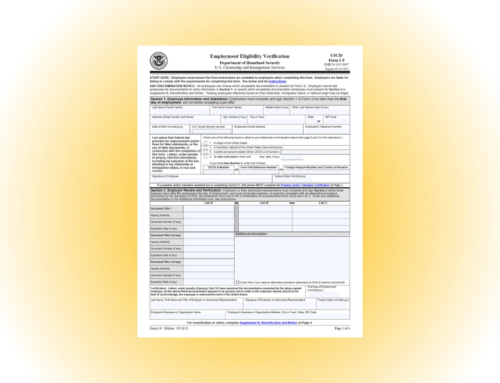On May 11, 2023, the federal COVID-19 public health emergency came to a close. Despite the official end of the pandemic, COVID-19 continues to persist. Consequently, employers are still obligated to adhere to the COVID-19-related guidance and directives issued by enforcement agencies.
Last month, the U.S. Equal Employment Opportunity Commission (EEOC) issued its capstone COVID-19 guidance, which provide updated recommendations for employers to navigate COVID-19 while ensuring compliance with the Americans with Disabilities Act (ADA) and other federal laws enforced by the EEOC. Notably, the agency revised its previous guidance on numerous specific inquiries, with particular emphasis on addressing concerns related to “long COVID.”
Updated COVID-19 Guidance on Reasonable Accommodations
The EEOC clarified that the end of the public health emergency doesn’t mean employers can automatically discontinue COVID-19-related disability accommodations. While accommodations may be reevaluated on a case-by-case basis, employers may still be obligated to individuals who face a particularly high risk of severe health consequences due to COVID-19. However, the EEOC added that employers may reevaluate the continued need for specific accommodations on a case-by-case basis. They also have the right to request employees to submit documentation supporting their continued need for accommodation and can explore alternative accommodations that are less disruptive or costly compared to those implemented during the pandemic.
Reasonable Accomodations for Employees with “Long Covid”
The EEOC provided examples of reasonable accommodations that could be considered for employees experiencing “Long COVID”. For instance, accommodations for brain fog, a symptom that is vaguely defined even by a recent study from the National Institutes of Health, could include providing a quiet work environment, using noise-canceling or white noise devices, and allowing uninterrupted work time. Headaches could potentially be addressed through alternative lighting options. Fatigue may be alleviated through flexible scheduling or telework arrangements. The EEOC recommends employers consult the Job Accommodations Network for further potential accommodations tailored to specific symptoms of long COVID.
The updated guidance also highlighted the fact that information about an employee having “Long COVID” is required to remain confidential in the same manner as other employee health info under the ADA.
The revised guidance also highlighted that the three-part definition of disability as outlined under the ADA applies to “Long COVID” as well as COVID-19. To that end, the guidance has been updated throughout to expand references to COVID-19 as a disability to also include “Long COVID.”
CDC Requirements Satisfy the “Business Necessity” Standard
Throughout the updated guidance, the EEOC revised language to underscore the importance of employers adhering to evolving CDC requirements regarding COVID-19. The guidance specifically recommends that employers refer to the CDC’s latest guidance to stay informed about the symptoms commonly associated with COVID-19. Furthermore, it states that following the CDC’s up-to-date recommendations on COVID-19 protocols for medical examinations and employee screenings will meet the ADA’s “business necessity” standard for conducting disability-related inquiries or conducting medical exams of employees.
Expanded Guidance on COVID-19 Screening
The EEOC’s updated guidance maintains that the screening of all applicants for COVID-19 is permissible. It also clarifies that screening a specific subset of applicants before making a job offer is acceptable, particularly for individuals falling into certain categories that are subject to COVID-19 screening. An example provided in the guidance is if those “entering a particular building on campus must undergo COVID-19 screening, an employer … may subject an applicant entering this building to the same screening, even though such screening is not routinely done when entering other buildings.”
Pandemic-Related Harassment
The revised guidance reiterates that protections against COVID-related discrimination based on disability, religion, national origin, and other protected characteristics remain in place. To assist supervisors, managers, and employees in understanding behaviors that may violate anti-discrimination laws related to COVID-19, the guidance suggests employers may want to provide examples of pandemic-related harassment. These examples include scenarios where a supervisor or coworker might violate the ADA by harassing an employee for wearing a mask due to a disability-related need, or they might violate Title VII by harassing an employee who’s granted religious accommodation to forgo mandatory vaccination.
The EEOC’s guidelines were provided to ensure compliance and promote safety in the workplace during the COVID-19 pandemic.
Employers now have increased flexibility in dealing with COVID-19 in the workplace compared to the regulations enforced during the public health emergency. However, their fundamental responsibilities to accommodate employees’ disabilities and ensure a safe and healthy work environment in the face of the persisting threat of COVID-19 remain unchanged.





